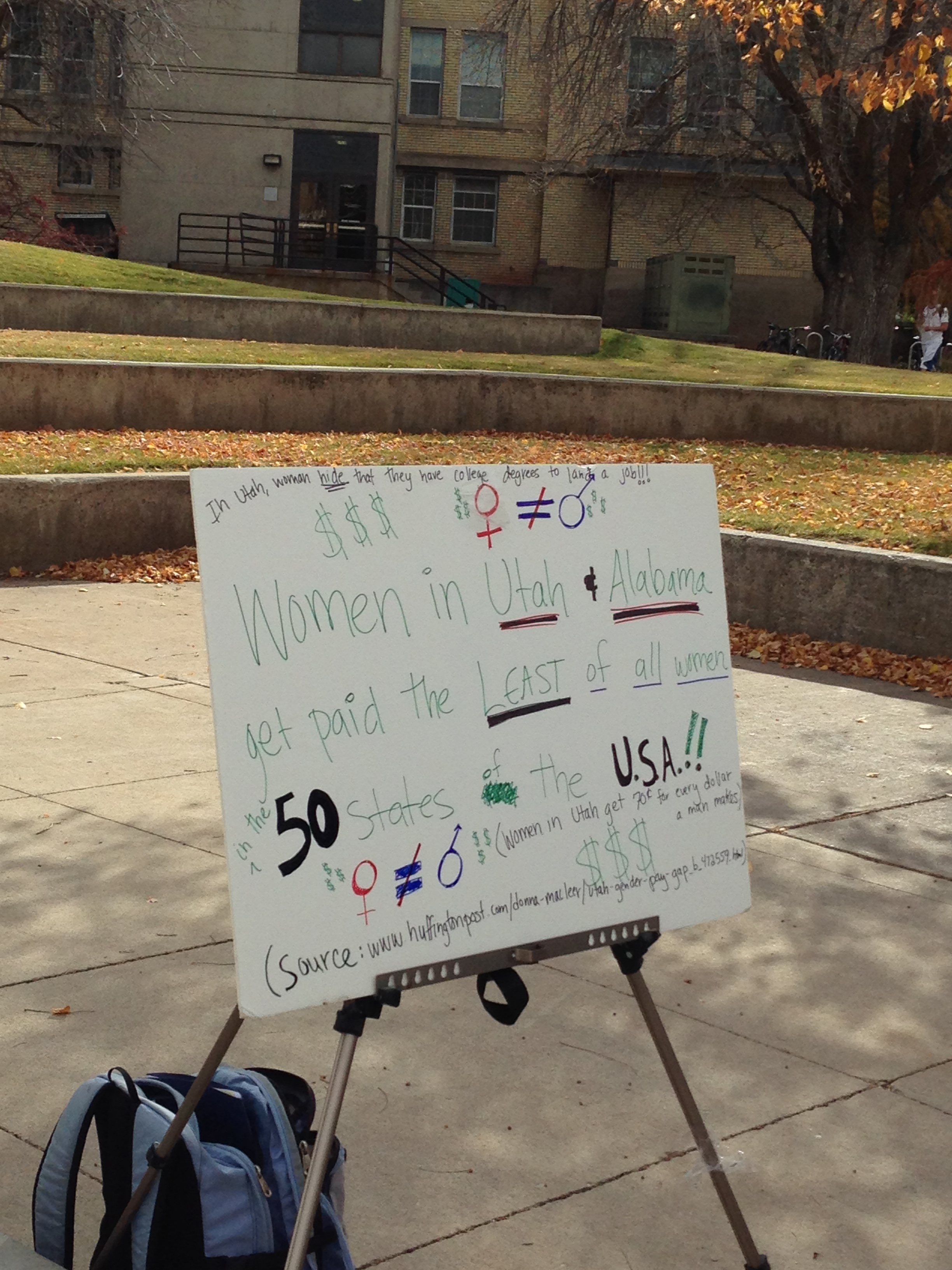Wage gap rally attempts to send message to students
Kara Luke, a former USU student, stood alone by the fountain outside the Taggart Student Center Monday afternoon, holding signs and passing out fliers to whomever was interested in her message about wage disparities.
There were several things Luke sought to address Monday: the wage gap between men and women in Utah, the hardships college graduates have in getting full-time employment, the low pay for teachers in Utah and the minimum wage in the state.
“The basic message is Utah hates its teacher and its women,” Luke said. “It hates both because they won’t pay us worth anything.”
According to Luke, women in Ogden make $0.65 for every $1.00 a man earns, and in Provo, the disparity is $0.61 cents on the dollar, but the amount of money women make nationwide is $0.77 on the dollar.
“It’s worse in Utah than anywhere else because women get paid the least here and the teachers get paid the least and have twice as many (students),” Luke said.
Aspen Gorry, assistant professor of economics, said these wage gaps do not necessarily mean there is discrimination.
“The question is how much of that is due to discrimination verses how much of that is due to the different kinds of work men and women do,” Gorry said. “Many women, for example, decide to work part time so that they can also spend some time at home with their children.”
He said there are other factors such as the hours people work and the education they receive that need to be controlled in order to get a better idea of the wage gap.
“Once you control for that — total hours worked, all of these other factors — often times these initial wage gaps shrink quite substantially,” Gorry said.
Luke said she worked as a teacher’s aid in an elementary school and was about to pursue a job as a teacher before she realized how poorly the state treats people in that profession.
“How do they treat their teachers? Like shit,” Luke said. “They give us twice as many kids and half the pay of anywhere else in the nation.”
Luke said there were 45 students in the classroom where she worked, which was a jump up from 33 students three years ago.
Luke said this is because Utah is laying off teachers and not making any more money for education.
“All they’d have to do is add a plastic bag tax and a soda pop tax, and then we’d have plenty of money for our educators and our future generations of Utah,” Luke said. “But no, our politicians want all of our kids to be numbskulls in classes of 50 or 75 kids a piece, and that’s not education; that’s prison.”
Luke said after a certain threshold of the amount of students in the classroom, teachers cease to be educators.
“You go from teacher to policeman and that’s it,” Luke said. “You are spending the whole day just making sure that kids are not goofing off and doing something productive and it doesn’t matter. They’re not learning crap.”
Luke said minimum wage should be $14 an hour everywhere for people to survive.
“Minimum wage is not just an entry-level thing anymore,” Luke said. “They’re forcing all my generation into entry-level jobs, and they’re not promoting us and they’re not giving us more hours.”
Gorry said a $14 minimum wage could be very damaging to the economy. He said some cities in the country have adopted a higher minimum wage, but it was not a huge burden because they are wealthier cities.
Gorry said in more rural places where the cost of living is low, it would be more difficult for employers to make up that minimum wage.
“If you did that, a lot of employers would have to either lay off more workers or find more money to pay all of the workers here in Logan,” Gorry said. “It’s just a different labor market than New York or Seattle.”
A flier Luke passed out invited people to hold signs with her, but most people either passed by without giving her attention or approached Luke to see what the rally was all about.
Kathryn Billeter, a freshman majoring in elementary education, said she agrees that women need better pay and more job opportunities. However, she said the message was probably not getting across to many passersby because Luke seemed to yell her message when talking to people.
“As a teacher, it’s not an effective method,” Billeter said. “If you’re going to get your message across, that’s not the way to do it.”
Billeter said a better approach for Luke would have been to be more conversational.
“If she was a little more willing talk to me instead of talk at me, it would have been a better conversation,” Billeter said. “I would have loved to hear what advice she had to give me especially because I am hoping to become a teacher and hopefully get paid.”
— topherwriter@gmail.com


Maybe if Ms. Luke were working on a Monday afternoon rather than complaining her wages would be a bit higher.
The fact that women tend to do different kinds of work from men and the fact that they tend to work less than men indicates an institutional kind of discrimination that we might not be able to account for economically. To understand how this works, consult a professor of philosophy rather than a professor of economy.
Good point. I didn’t really think of that in the time it took to write the article. I’ll keep that in mind next time.